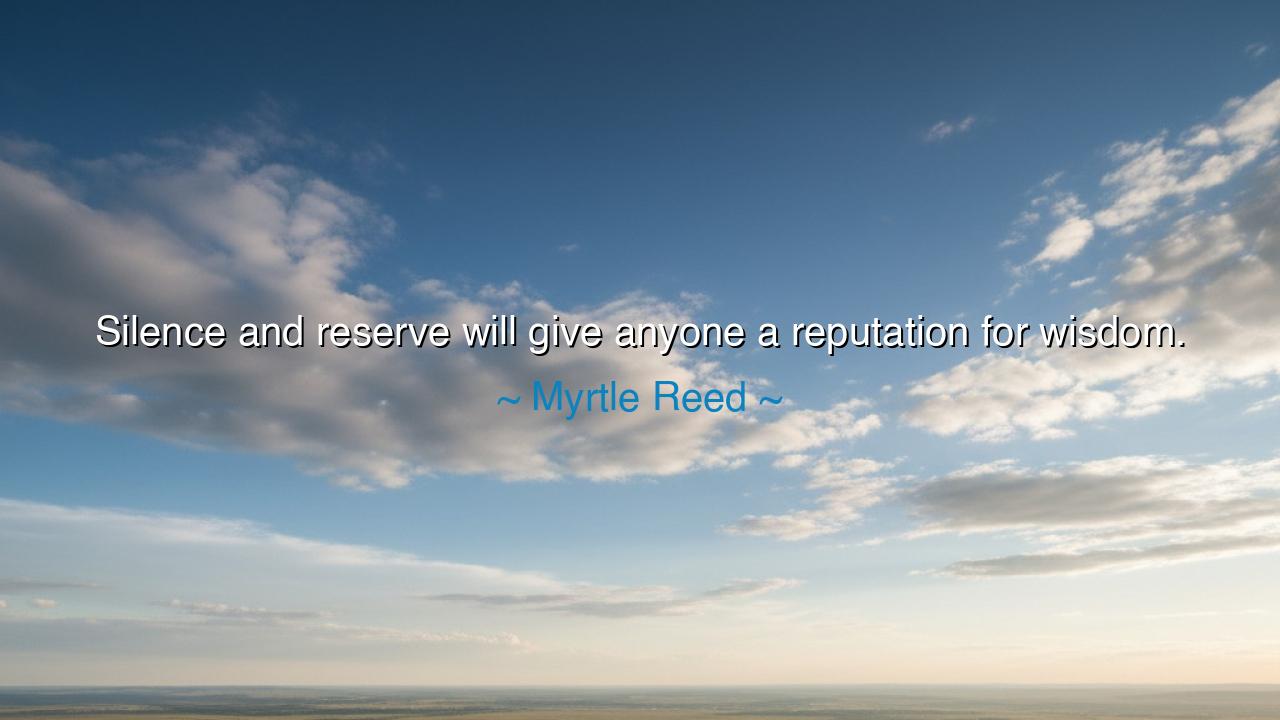
Silence and reserve will give anyone a reputation for wisdom.






Myrtle Reed, with the quiet grace of one who understood the power of words unsaid, observed: “Silence and reserve will give anyone a reputation for wisdom.” In this subtle truth lies the understanding that wisdom is not always a matter of speaking often or loudly, but of knowing when to remain silent, when to withhold, and when to observe. Silence and reserve—qualities that have long been associated with the sage—are not the absence of thought or insight, but a reflection of the deep understanding that not every thought needs to be spoken. Often, it is in the quiet moments, when the noise of the world fades, that true wisdom arises.
The meaning of Reed’s words is both profound and liberating. In a world that often values outspokenness and assertiveness, there is power in restraint. Wisdom is not about dominating a conversation with clever words or forceful opinions, but about knowing when to speak and when to listen. The one who speaks little, yet speaks with intention, quickly earns the reputation of someone who understands the weight of their words. The world may misinterpret this silence as mystery, but it is actually the quiet reflection of one who has learned the art of discernment.
Consider the example of Socrates, who, despite his famous dialogues, often chose silence in the face of foolishness. His wisdom lay not only in his words, but in his ability to listen, to observe, and to respond only when necessary. Socrates understood that true wisdom did not lie in the volume of one’s speech, but in the reserve to speak only when the time was right. In this, he earned a reputation not just as a philosopher, but as a wise man whose every word carried weight.
This principle of silence as wisdom is also seen in the life of Confucius, whose teachings have endured for millennia. Confucius was known to speak little about matters that did not concern him, preferring instead to reflect deeply before offering counsel. His very restraint in speech lent him an air of reverence, and his followers saw in him not only a teacher, but a model of wisdom in action. The wise man knows when his voice is needed, and more importantly, when it should remain still.
Therefore, let the seeker of wisdom remember that true greatness is often found in restraint, not in the constant clamor for attention. Silence is not the absence of thought, but the presence of discernment. Those who possess the ability to speak with purpose, and to remain silent when necessary, are seen not as fools, but as sages. Myrtle Reed’s words echo across the ages: wisdom is not measured by how much one says, but by the care and thoughtfulness with which one speaks—and, just as importantly, by the quiet wisdom that remains unspoken.






TPtantoi pham
This statement makes me think about social manipulation. If someone understands that quietness enhances perceived wisdom, could they exploit this to gain trust or authority without merit? It also brings up the tension between perception and substance—can wisdom exist independently of reputation, or is it inseparable from how others see you? I’m curious whether this phenomenon is more common in professional environments, politics, or personal relationships, and how it shapes decision-making and influence.
PLNguyen Thi Phuong Linh
I feel intrigued but conflicted. Silence might project wisdom, but what about people who have valuable insights yet are naturally outspoken? Could this idea unintentionally encourage passivity or discourage sharing knowledge? At the same time, perhaps there’s a strategic side to listening and observing before speaking, which allows one to provide more meaningful contributions. How much of being seen as wise is a matter of social performance versus actual intelligence?
ATPhan Anh Thu
This perspective is fascinating because it suggests social perception is sometimes more influential than true knowledge. Could it be that people who are naturally reserved benefit from this unconscious bias, gaining credibility without necessarily earning it? I also question whether actively contributing ideas, even imperfectly, might risk reputation but ultimately cultivate genuine wisdom. How can one balance the benefits of silence with the necessity of engagement in collaborative settings?
HDdo phi hung dophihung
I feel a little skeptical about this idea. Isn’t there a danger that silence could be mistaken for wisdom when it’s actually indecision or ignorance? On the other hand, maybe restraint allows people to listen more and speak with intention, which does create a form of wisdom. I wonder whether cultural norms also play a role—do some societies value quiet reflection more, thereby amplifying the reputation effect, while others prioritize assertiveness?
MPMai Pham
This makes me wonder if reputation can be separated from actual wisdom. If someone is silent and reserved, others might assume they are wise, but does that perception hold any real value? It also raises the question of whether people who speak less are naturally more thoughtful or if the world simply rewards mystery. I’m curious how this dynamic affects leadership roles, where communication is often essential—can a leader be respected as wise without being actively vocal?